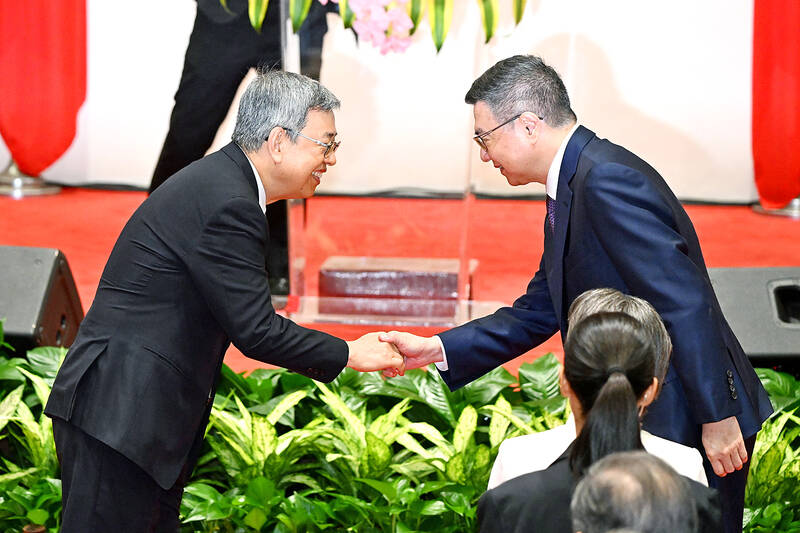Premier Cho Jung-tai (卓榮泰), the newly appointed head of the Executive Yuan, yesterday vowed to combat rampant fraud in Taiwan and said the government would not abandon its goal of creating a “nuclear-free homeland.”
The Cabinet would focus on cracking down on fraud, as well as crimes involving corruption, illegal arms possession and drugs, Cho said in a speech delivered during a handover ceremony yesterday.
The new premier, who took over the role yesterday after Chen Chien-jen (陳建仁) and his Cabinet tendered their resignation en masse last week, called for support from lawmakers to pass four draft bills that would greatly enhance the government’s ability to combat fraud.

Photo: Lin Cheng-kun, Taipei Times
He was referring to two draft bills approved by the Cabinet on May 9 — one on fraud crime prevention and another on the use and oversight of science and technology in investigations — as well as draft amendments to the Communication Security and Surveillance Act (通訊保障及監察法) and Money Laundering Control Act (洗錢防制法). All four bills have been submitted to the Legislative Yuan for deliberation.
Cho vowed to punish fraudsters for their criminal actions, warning that those who commit fraud would not have their ill-gotten gains for long, as they would be caught and brought to justice.
In addition, Cho said that Taiwan’s economy has become an indispensable part of the world economy, and the government has the responsibility to create a more stable environment for economic development.
The government would continue to push for green energy development while maintaining a stable power supply, and would never give up on the pursuit of a non-nuclear homeland, he added.
The ceremony held at the Executive Yuan was attended by Chen and Vice President Hsiao Bi-khim (蕭美琴).
Chen, who had served as premier since Jan. 31 last year, following the resignation of then-premier Su Tseng-chang (蘇貞昌), said combating fraud is an important task for the new administration, adding that the government would rise to the task under Cho’s leadership.
Hsiao said that Cho comes to the position with solutions to problems and fresh thinking, with the ability to listen to local voices and work to build a Taiwan that is democratic, peaceful, innovative and prosperous.

Taiwan has received more than US$70 million in royalties as of the end of last year from developing the F-16V jet as countries worldwide purchase or upgrade to this popular model, government and military officials said on Saturday. Taiwan funded the development of the F-16V jet and ended up the sole investor as other countries withdrew from the program. Now the F-16V is increasingly popular and countries must pay Taiwan a percentage in royalties when they purchase new F-16V aircraft or upgrade older F-16 models. The next five years are expected to be the peak for these royalties, with Taiwan potentially earning

STAY IN YOUR LANE: As the US and Israel attack Iran, the ministry has warned China not to overstep by including Taiwanese citizens in its evacuation orders The Ministry of Foreign Affairs (MOFA) yesterday rebuked a statement by China’s embassy in Israel that it would evacuate Taiwanese holders of Chinese travel documents from Israel amid the latter’s escalating conflict with Iran. Tensions have risen across the Middle East in the wake of US and Israeli airstrikes on Iran beginning Saturday. China subsequently issued an evacuation notice for its citizens. In a news release, the Chinese embassy in Israel said holders of “Taiwan compatriot permits (台胞證)” issued to Taiwanese nationals by Chinese authorities for travel to China — could register for evacuation to Egypt. In Taipei, the ministry yesterday said Taiwan

Taiwan is awaiting official notification from the US regarding the status of the Agreement on Reciprocal Trade (ART) after the US Supreme Court ruled US President Donald Trump's global tariffs unconstitutional. Speaking to reporters before a legislative hearing today, Premier Cho Jung-tai (卓榮泰) said that Taiwan's negotiation team remains focused on ensuring that the bilateral trade deal remains intact despite the legal challenge to Trump's tariff policy. "The US has pledged to notify its trade partners once the subsequent administrative and legal processes are finalized, and that certainly includes Taiwan," Cho said when asked about opposition parties’ doubts that the ART was

If China chose to invade Taiwan tomorrow, it would only have to sever three undersea fiber-optic cable clusters to cause a data blackout, Jason Hsu (許毓仁), a senior fellow at the Hudson Institute and former Chinese Nationalist Party (KMT) legislator, told a US security panel yesterday. In a Taiwan contingency, cable disruption would be one of the earliest preinvasion actions and the signal that escalation had begun, he said, adding that Taiwan’s current cable repair capabilities are insufficient. The US-China Economic and Security Review Commission (USCC) yesterday held a hearing on US-China Competition Under the Sea, with Hsu speaking on